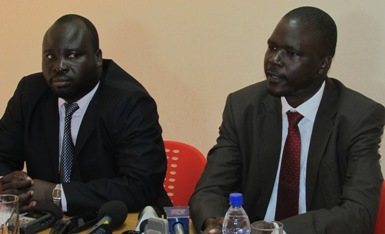Rebels say regional leaders need to take united stand to end S. Sudan crisis
November 10, 2014 (KAMPALA) – Senior officials from South Sudan’s rebel diplomatic mission to Uganda have praised a recent agreement brokered by regional leaders between the country’s warring parties as an important step towards restoring peace.

David accused president Salva Kiir of trying to bulldoze peace negotiations, saying the recent decision showed that IGAD member states could take a united stance.
“If the regional leaders come together harmoniously and speak as a voice, definitely peace will come to South Sudan and prevail over president Salva Kiir to tell him that the country is not bigger than [the] individual,” he said.
“The spirit I saw recently in Addis Ababa is the good spirit we need to take it forward,” he added.
He said negotiations in the past had been hampered by regional alliances and loyalties, accusing some regional leaders of IGAD member states of being driven by self-interest rather than resolving the ongoing conflict.
“I know Uganda has got interest in South Sudan, Kenya has got interest in South Sudan, Ethiopia has got interest in South Sudan and because of all these divergent interests; it is one of the issues that [is] causing a lot of stalemates the peace process in South Sudan,” said the rebel official.
He told Sudan Tribune that regional member of states must exert more pressure on president Kiir to stand aside for the sake of peace in the country.
The recent decision by the regional leaders came after the international community and the UN Security Council threatened to put South Sudan under United Nation headship.
Many East African countries in the region have shared strong ties with South Sudan in term of trade before and after its independence from Sudan in 2011.
Uganda is the main exporter of goods to South Sudan and has sent thousands of troops to fight alongside government forces attempting to quash a rebellion led by former vice-president Riek Machar, was sacked by Kiir last July.
David said South Sudan represented a large potential market for the East African regional bloc, but warned further trade and development would continue to stall unless peace was restored.
“They have a choice … South Sudan is offering a huge market; it has got huge resources. You remember the issue of Lamu port, the pipeline project for the huge oil reserves in South Sudan and if they are not serious those interest will be affected,” said David.
South Sudan crisis erupted last year in December when an internal rift within the ruling party (SPLM) turned violent, triggering ethnic tensions across the country between the Dinka and Nuer, the two largest tribal groups.
(ST)
